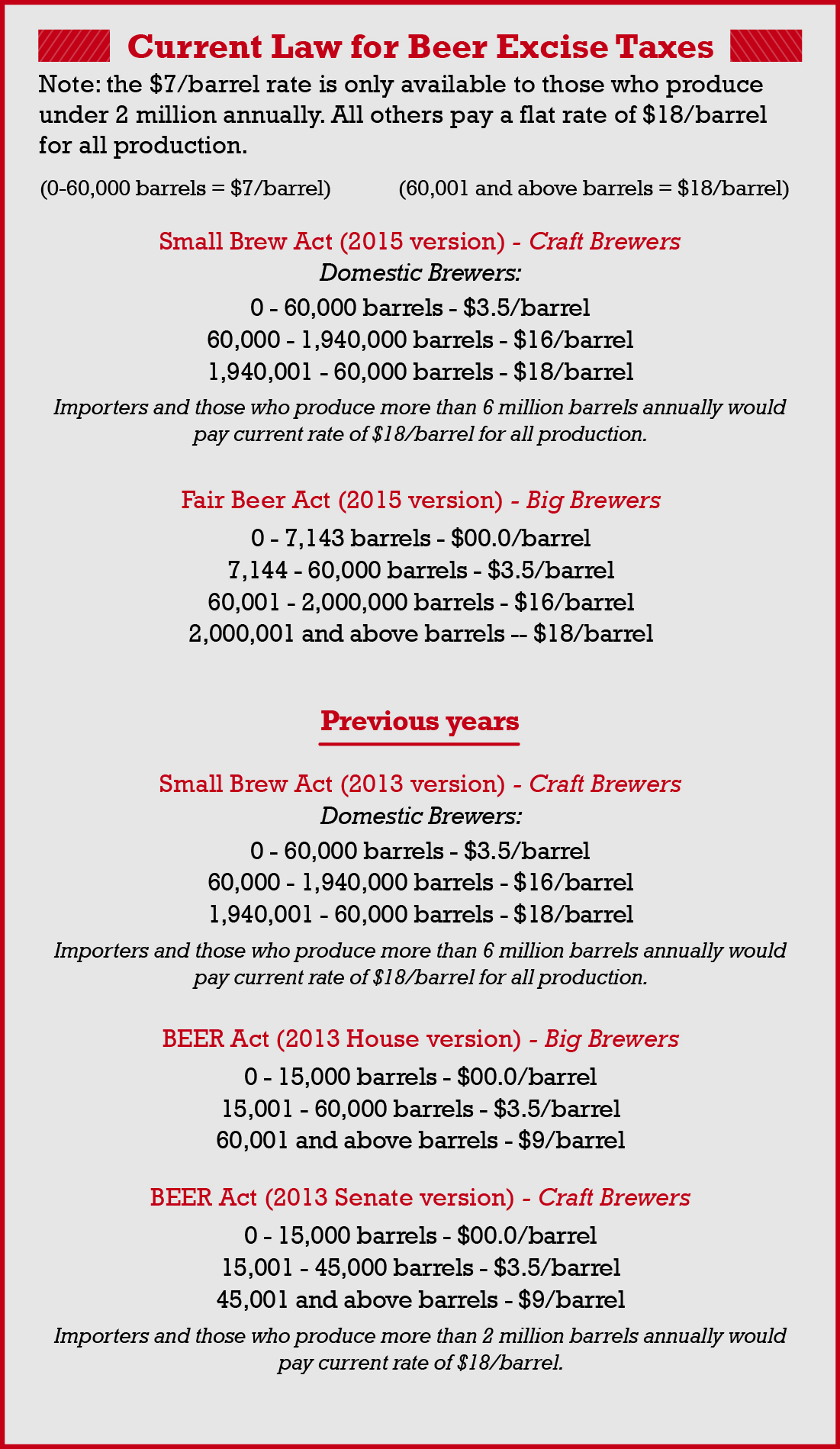It’s not often that companies dramatically scale back their legislative proposals for Congress and largely adopt the same ones as their smaller rivals, but that has happened with the beer industry.
For years, the Beer Institute, a trade association representing major brewers such as Anheuser-Busch, MillerCoors and Heineken USA, has backed legislation that would reduce the current top excise tax rate for golden, sudsy beverages from $18 a barrel to $9.
This year, the institute abruptly reversed course and is now backing legislation dubbed the Fair Beer Act that would provide more modest tax savings but keep the current $18 top rate.
The proposal largely adopts the same tax rate structure proposed by the Small Brew Act, rival legislation that mainly boosts the smaller craft beer industry but tweaks it to provide some relief to larger brewers as well.
“Our view is that reform is better than what we had previously pursued, which was essentially a rollback,” of the excise tax, said Jim McGreevy, the institute’s president and CEO, noting the Fair Beer Act overhauls taxes industry-wide.
Critics see a different reason for the change: The new, reformed rates would apply to both domestic and imported beer.
“I don’t think it’s a wise investment to give more tax breaks to foreign-owned conglomerates that have recently cut American jobs,” said Rep. Pete DeFazio, D-Ore., a co-sponsor of the Small Brew Act.
Foreign-owned companies represent a majority of Beer Institute’s five voting members. Anheuser-Busch is a subsidiary of the Belgian conglomerate AB InBev. MillerCoors is a joint venture of the U.S.-Canadian company Molson Coors and the British one SABMiller. Heineken USA is the American branch of its Dutch namesake. Another institute member, Constellation Brands, is a U.S. company that imports Mexican-brewed beers, chiefly Corona. Its membership includes smaller brewers as well.
Currently, major brewers pay a flat $18 tax per barrel of beer. Small brewers, however, get a break, paying only $7 per barrel on the first 60,000 they produce, but the regular $18 tax after that. This advantage is available only to those who annually produce less than two million barrels overall. By comparison, Anheuser-Busch alone sells an estimated 100 million barrels in the U.S. annually.
Both the big brewers and the craft beer industry have complained for years about the rate structure. The big brewers argue the $18 rate is too high and craft brewers say the 60,000 barrel cut-off for the tax break cripples small brewers once they become successful.
The Small Brew Act would tax the first 60,000 barrels at a rate of $3.50, then rise to $16 until production hits 1.94 million. After that, it would reach $18 a barrel. The rates would apply only to domestic brewers who produce less than 6 million barrels annually. That would extend the tax relief to medium-sized companies such as Sam Adams but block the bigger companies.
The Fair Beer Act applies no taxes at all to smallest producers, with the rates not kicking in until just after production hits 7,143 barrels. The rates then closely follow the ones in the Small Brew Act. But the rates apply to all producers, domestic and foreign, regardless of their size.
“Right now, those [foreign] companies pay $18 on every barrel they import,” noted Bob Pease, chief executive officer of the Brewers Association, which backs the Small Brew Act. “So under the Fair Beer Act, they’d get savings on their first two million barrels.”
Supporting craft beer makers has become a popular cause for many lawmakers, who argue the upstarts are entrepreneurs creating local jobs. Sen. Ben Cardin, D-Md., lead sponsor of the Senate version of the Small Brew Act, is himself a craft beer maker.
“These are small businesses that support good-paying American jobs and reinvest profits into the local economy by buying equipment and hiring more workers,” DeFazio said.
Congressional staffers involved in pushing the Small Brew Act say that the big brewers are essentially trying to co-opt the support for the craft beer industry-related legislation by mimicking it.
“The theory is that they viewed pushing for lower rates as a bulwark against a potential rate increase,” said one Democratic aide. “Then they saw us get pretty close to getting over the finish line [in the previous Congress] so they’ve ramped up the advocacy for their bill.”
What’s more, they add, it might actually work. Both sides are eager to get something through Congress. While incorporating the Fair Beer Act is a nonstarter for people like DeFazio, staffers for some lawmakers backing the Small Brew Act didn’t rule out a compromise. “The small brewers get their tax break with both bills,” noted another Democratic staffer.
It’s not a partisan issue, either, as support for both bills crosses party lines. The Small Brew Act has 23 House co-sponsors and 28 Senate ones, while the Fair Beer Act has 35 House co-sponsors. A Senate version of the Fair Beer Act hasn’t been introduced.
Claire Burghoff, spokesman for Rep. Steve Womack, R-Ark., lead sponsor of the Fair Beer Act, said in an email her boss had supported the Small Brew Act in the last Congress, but believes the new proposal is a “better fix.”
“Congressman Womack believes the Fair Beer Act … presents an industry-wide solution by applying a graduated tax structure equally across the industry and ending the practice of picking winners and losers,” Burghoff said.
The Beer Institute’s McGreevy made the same argument, saying, “We don’t think we can have reform that isn’t industry-wide.”
The Fair Beer Act has been praised by the conservative group Americans for Tax Reform, which notes that the bill provides more relief overall to American brewers by zeroing out the tax for the smallest producers.
Patrick Gleason, the group’s state affairs director, shrugged off the fact that that would be extending tax benefits to importers. “Beer excise taxes are eventually passed along to consumers at the end of the day, regardless of whether or not one is buying a pint of domestic or imported beer.”

